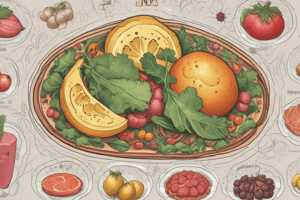Podcast
Questions and Answers
What is the main purpose of sensory evaluation in the context of food quality?
What is the main purpose of sensory evaluation in the context of food quality?
- To analyze the chemical composition of food items
- To determine the nutritional value of food items
- To measure the physical properties of food products
- To assess how food characteristics are perceived by the senses (correct)
Which sense is related to the perception of aroma during food degustation?
Which sense is related to the perception of aroma during food degustation?
- Taste
- Touch
- Sight
- Smell (correct)
What does sensory analysis seek to evoke and measure in relation to food characteristics?
What does sensory analysis seek to evoke and measure in relation to food characteristics?
- Reactions to characteristics perceived by the senses (correct)
- Chemical reactions in the food
- Nutritional content of the food
- Physical appearance of the food
Which sensory organ is involved in perceiving odors through the direct nasal pathway?
Which sensory organ is involved in perceiving odors through the direct nasal pathway?
What is the role of the perception of organoleptic quality in the context of sensory analysis?
What is the role of the perception of organoleptic quality in the context of sensory analysis?
Which sense is related to the perception of sound in the context of sensory analysis?
Which sense is related to the perception of sound in the context of sensory analysis?
What is the term for the complex set of olfactory and gustatory sensations perceived during consumption?
What is the term for the complex set of olfactory and gustatory sensations perceived during consumption?
Which substance qualifies the complex sensation resulting from the contraction of the surface of the mucous membranes of the mouth?
Which substance qualifies the complex sensation resulting from the contraction of the surface of the mucous membranes of the mouth?
What is the purpose of sensory analysis?
What is the purpose of sensory analysis?
Which factor influences sensory response through a priori influences like rose-tinted yogurt and colored white wine?
Which factor influences sensory response through a priori influences like rose-tinted yogurt and colored white wine?
What do substances such as lemon, orange, and coca cola represent in terms of taste?
What do substances such as lemon, orange, and coca cola represent in terms of taste?
What is the pathway through which volatile compounds are expelled from the matrix during chewing?
What is the pathway through which volatile compounds are expelled from the matrix during chewing?
What is the term for the contraction of the surface of the mucous membranes of the mouth produced by substances like tannins?
What is the term for the contraction of the surface of the mucous membranes of the mouth produced by substances like tannins?
Which substances represent a bitter taste due to their content?
Which substances represent a bitter taste due to their content?
"Taste/Flavor: sensations perceived by the taste organ when stimulated by certain soluble substances" implies that taste/flavor sensations are perceived by:
"Taste/Flavor: sensations perceived by the taste organ when stimulated by certain soluble substances" implies that taste/flavor sensations are perceived by:
Flashcards are hidden until you start studying
Study Notes
- Sensory analysis is a scientific method used to evaluate the organoleptic qualities of foods and materials.
- Organoleptic quality includes sensory characteristics perceived through the senses of sight, smell, taste, touch, and hearing.
- Sensory evaluation involves evoking, measuring, analyzing, and interpreting reactions to the characteristics of foods and materials.
- Sensory analysis uses the terms odor and aroma interchangeably, but with different meanings: odor is the release of volatile substances perceived directly by the nose, while aroma is perceived through the retro-nasal pathway during degustation.
- Taste or flavor is the complex set of olfactory and gustatory sensations perceived during consumption.
- There are several tastes or flavor profiles, including sour, bitter, salty, and sweet.
- Sensory analysis is used for research and development, quality control, marketing, and consumer preference research.
- The physiology of perception involves the transformation of stimuli into nervous influxes, which are then interpreted by the brain.
- The sensory response is influenced by both physiological and psychological factors.
- Physiological factors include ageusia (loss of taste), persistence (duration of the sensation), and sensitivity to different stimuli.
- Psychological factors include prior expectations, nearby influences, and the order of presentation of samples.
Studying That Suits You
Use AI to generate personalized quizzes and flashcards to suit your learning preferences.




